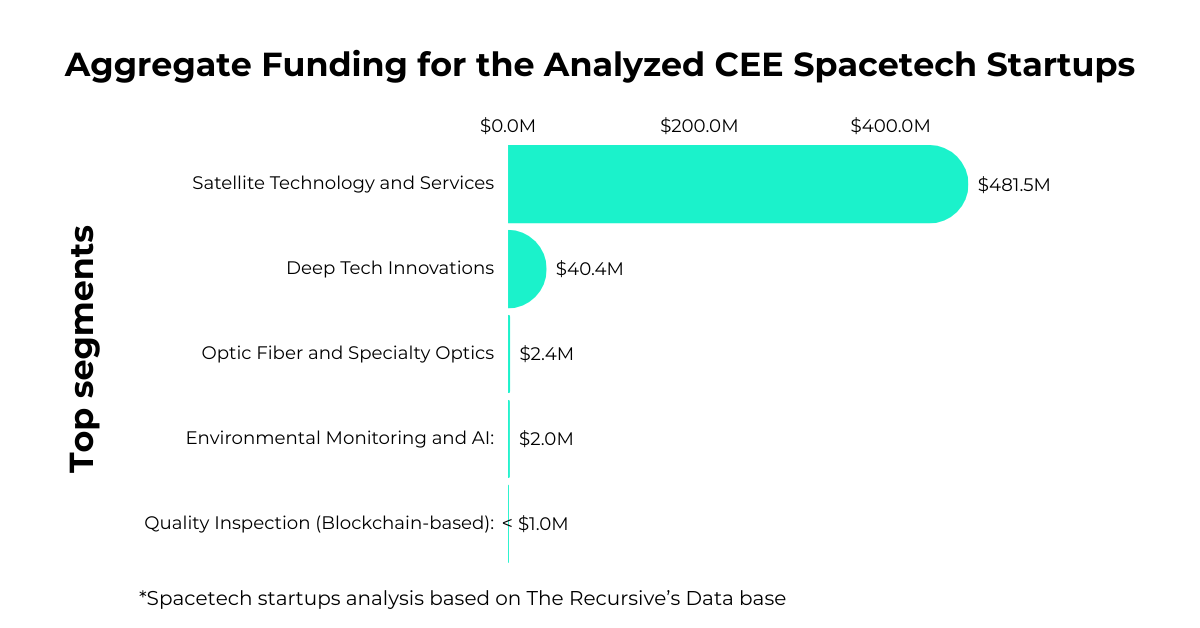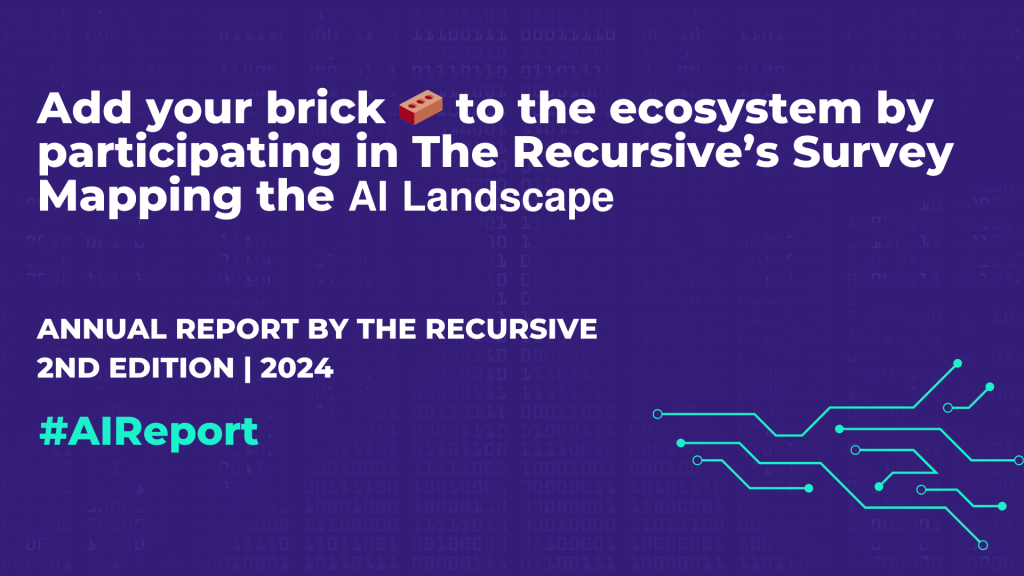In recent years, startups in CEE have begun capitalizing on the momentum of the space tech industry, a field historically dominated by governments due to high entry barriers and the need for deep expertise. Europe (with already three unicorns in the spacetech field, OneWeb, Lilium, TomTom), is the second region in terms of market share across the spacetech upstream segment, according to Dealroom data, followed by China and Canada, and the rest of the world.
Zooming at the CEE level, the region already has a potential future unicorn in this field, Polish-rooted ICEYE founded by Rafal Modrzewski (Polish) and Pekka Laurila (Finish), with a total funding of $395M. The startup owns the world’s largest synthetic-aperture radar constellation. The company enables objective, data-driven decisions for its customers in sectors such as insurance, natural catastrophe response and recovery, security, maritime monitoring and finance. ICEYE’s data can be collected day or night, and even through cloud cover.
Additionally, several other promising startups from the region are emerging, particularly in the Czech Republic, Poland and Bulgaria if we look at the number of startups, rounds raised and the total funding.
Where Is Spacetech Heading in CEE?
The global spacetech economy is expected to grow to $10T by 2030 according to Space Tech Analytics. Space technology includes the hardware, equipment, and systems used in space exploration and development, as well as the technologies and processes that support their operation and maintenance.
What Facilitated the Spacetech Growth the Most?
In a previous interview, we talked with Dr. S. Pete Worden, former Director of NASA’s Ames Research Center and currently Chairman of the Breakthrough Prize Foundation about the developments of this industry and what changes he’s seen.
He believes that advancements in technology enabling more frequent space missions will foster the development of even more advanced technologies.
“The timeframe required to conceptualize, create, and execute a mission has been drastically condensed. Today, missions can be accomplished within a year’s span, enabling professionals, including students, to engage in multiple endeavors throughout their careers. This shift introduces a sense of reward and progress. Moreover, the accelerated pace of mission development provides invaluable learning opportunities. When you only engage in a single mission, lessons remain scarce. However, with the possibility of multiple missions, around ten or even twenty, the approach becomes iterative. This means that lessons from one mission can inform the next, enabling growth and refinement.”
We reviewed the spacetech startups from CEE over the past 12 months. Some new early-stage startups emerged in 2024, while others raised significant funds. We compiled a listicle: “10 Spacetech Startups in CEE You Should Follow”.
What Technology is Used by the CEE Spacetech Startups?
The technologies used by the CEE spacetech startups include:
- Artificial Intelligence (AI): Used for data analysis, satellite imaging, and autonomous operations.
Startups: SatRev, ICEYE - Blockchain: Applied for secure data transactions, satellite communication, and logistics management.
Startups: Thorium, EnduroSat - Satellite Technology: Fundamental for communication, Earth observation, and navigation.
Startups: ICEYE, SatRev - Small Satellite Launch Capabilities: Developed for deploying small satellites into orbit.
Startups: SatRev - Deep Tech Innovations: Advanced technology applications in space missions and digital infrastructure.
Startups: EnduroSat, Orbital Matter
The segments most funded for the analyzed CEE spacetech startups:

Who is Investing in Space Technology Startups in CEE?
Besides important enablers from the public sector such as: European Innovation Council, National Research Centers, ESA (European Space Agency) and EUSPA (European Union Agency for the Space Programme), there are large organizations and VCs who added in their portfolio at least one startup from spacetech, such as:
Imperio: a venture capital firm investing in the information technology, products, services, ITC, and e-commerce sectors.
Spacetech startups they invested in: $380k in SatRev.
Virgin Orbit – a vertically integrated space company that provides customers with dedicated small satellite launch capabilities.
Spacetech startups they invested in: together with Millennials Venture Capital ASI S.A., Virgin Orbit invested $5.2M in SatRev.
NEVEQ – the GP of two institutionally backed VC funds.
Spacetech startups they invested in: together with Imperia Online and Trading212, they invested in EnduroSat, the amount remained undisclosed.
Neo Ventures – a deep tech fund invested in builders of digital infrastructure for smart cities, outpatient healthcare and space missions.
Spacetech startups they invested in: $1M in EnduroSat.
Sunfish Partners – an early stage VC that invests in deep tech startups from Central and Eastern Europe (CEE).
Spacetech startups they invested in: $1M in Orbital Matter.
Freya Capital – a venture capital fund supporting and financing innovative businesses making an impact on tomorrow’s world.
Spacetech startups they invested in: together with bValue and Sunfish Partners invested in Liftero, the amount remained undisclosed.
bValue Fund – a specialized growth equity investment firm that partners with tech and tech-enabled businesses in CEE.
Spacetech startups they invested in: co-invested in Liftero.
Solidium – a limited liability company owned by the State of Finland, whose mission is to strengthen and stabilize domestic ownership in nationally significant companies and to increase the economic value of holdings in the long term.
Spacetech startups they invested in: together with Blackwells Capital and Move Capital Fund invested $93M in ICEYE.
Blackwells Capital – an alternative investment manager, focused on global fundamental and special situation investing.
Spacetech startups they invested in: co-invested in ICEYE.
Move Capital (Fund I) – a pan-European Growth Equity fund focused on highly strategic sectors around the Data value chain and aims to nurture European Tech champions.
Spacetech startups they invested in: co-invested in ICEYE.
Freigeist Capital – a privately-owned investment fund working with visionary founders to build disruptive technology companies.
Spacetech startups they invested in: together with CEECAT Capital invested $9.1m in EnduroSat.
CEECAT Capital – a leading private equity and private credit investor, focused on high growth markets of Emerging Europe and Central Asia.
Spacetech startups they invested in: co-invested in EnduroSat.
Smartlink Partners – a venture capital fund that combines the business expertise of Poland’s leading entrepreneurs with the professionalism of experienced investors.
Spacetech startups they invested in: $960k in Thorium.
We invite all CEE key players (founders, VCs, ecosystem builders) to participate by filling out The Recursive’s survey Mapping the AI Landscape 2024 to ensure comprehensive coverage. Your insights are invaluable to us. Please send any comments or additional information to [email protected].








